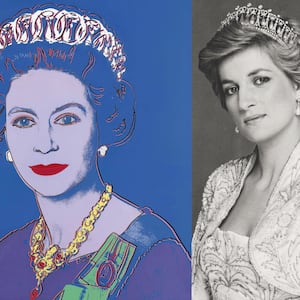On December 18, 1969, Judge Roy Hofheinz dressed in the costume of a British barrister, powdered wig and all, entered his new Astroworld Hotel in Houston, and rode the sparkling glass elevator up to the penthouse.
When the doors opened, one can only imagine the delight and glee the judge felt as he surveyed the riot of colors, outlandish decor schemes, and luxurious touches that could have stepped right off the big screen. (In fact, some of the accent pieces had done just that.)
It was exactly what he wanted for his new home, and he was eager to show it off that night at the press preview-cum-housewarming party.
In the previous decade, Hofheinz had brought a Major League Baseball team to Space City, rebranded them the Astros, built a world-class stadium that was dubbed the “Eighth Wonder of the World,” and topped it all off with an amusement park. Guests to all of the above were encouraged to stay at the new Astroworld Hotel located nearby, but the upper two levels known as the Celestial Suites were reserved solely for Hofheinz. Or at least that was the plan.
“The razzle dazzle rendezvous that would even cause P.T. Barnum to blink in wonderment is snuggled nine stories in the sky via glass elevator, and the Dome Stadium daddy has christened it ‘The Celestial Suite at the Penthouse Level,’” Houston society columnist Betty Ewing wrote in her inaugural review of the space for the Houston Chronicle.
For five years, Hofheinz enjoyed his custom pleasure palace, but, according to Leslie Sowers in a 1993 Houston Chronicle article, he soon realized the mint he could make from renting out his beloved pied-à-terre. It didn’t hurt that he had two other residences in the city awaiting his stay.
What began as something of an Airbnb scheme when high-paying guests popped up eventually morphed into a permanent situation; in the mid-1970s, the Celestial Suites were opened to the fat-walleted public for such a hefty price tag ($3,000 a night) that they made the 1977 Guinness World Records for most expensive hotel suite in the world.
Over the ensuing decades, many changes came to the hotel: owners, names, until finally, one day, the doors of the Celestial Suites were locked for good. For years, the penthouse in what is now a Crowne Plaza Hotel in Houston has been closed to the public. But behind the unassuming doors still lies a time capsule to the outlandish vision of one colorful Texan in the 1970s.
Throughout history, characters periodically appear who manage to be both wholly authentic and walking, talking caricatures of the particular time and place in which they live. Hofheinz was one of these. If there weren’t copious witnesses to his larger-than-life existence, one would imagine the writer of his story had taken a few liberties.
The garrulous epitome of a rich mid-century Texan, Hofheinz lived without limits, becoming first a judge, then a mayor, and finally entering the money-paved world of business.
He had an obsessive love for air conditioning (understandable to anyone who has spent a summer in Texas) and big fat stogies, which were reportedly so constantly a presence that they seemed almost surgically attached to his hand. But perhaps the greatest of his passions was for his beloved Astros empire—the Houston Astros baseball team, their home in the new Astrodome, Astroworld amusement park, and the AstroWorld Hotel.
Hofheinz’s innovations in the sports and amusement arenas often extended to the technological—he introduced the ideas of air conditioning and executive suites to sports stadiums, not to mention his iconic dome, and he treated guests waiting in line for rides at AstroWorld to the novelty of outdoor AC. But when it came to his personal pride and joy, the Celestial Suites, he went full Hollywood.
To get just the right amount of over-the-top glamor, to achieve the appropriate air of luxurious excess, and to embrace his preferred aesthetic of carnivalesque kitsch, Hofheinz called on the only man for the job: Harper Goff, a movie set designer and the mastermind behind parts of Disneyland who had earned the nickname “the Second Imagineer.” (Walt Disney was the first.)
According to Goff, his instructions from Hofheinz were thus: “I want a penthouse so designed that when people come to visit me, they will have never seen anything like it. I want nobody ever to be able to top me, or top this penthouse.” It was an exciting and challenging project, and one that ended in a rousing success according to its two masterminds.
The Celestial Suites couldn’t be beat when it came to pure luxury. There was a massive sunken tub styled after a Roman bath, a two-story nightclub with a mini-dome on top, and a library that took its inspiration from a Madrid palace. Goff traveled the world collecting antiques and curiosities to populate the space that was filled with gold leaf and ornamental flourishes.
But it was in its ode to all things Hollywood and the circus that the Celestial Suites really inspired wonder. The six bedrooms each had a different theme. There was the P.T. Barnum Suite (appropriate for Hofheinz, who had recently become a major shareholder in the Ringing Bros. and Barnum & Bailey Circus), which had a room with a circus tent ceiling and carousel horses straight from the Big Top. Another room in the carnival collection featured a king-size bed made out of an actual circus bandwagon that was covered in velvet and paired with a bronze sculpture of Tom Thumb and a tiger skin from a former performer.
The adventure suite carried the Tarzan room that was a two-story space with a fake tree sprouting in the middle and shag carpet that looked like grass. The rope swing was removed early in its tenure after an unfortunate occupant swung themselves through a glass wall, but the copious amounts of leopard print, greenery, and bamboo remained. It was paired with the Fu Man Chu room that was a Hollywood take on all things chinoiserie.
Hofheinz slept in what was known as the Crusader room, which was bedazzled with stained glass windows, a suit of armor, Roman columns, and a massive bed that had a TV hidden inside.
The dining room, named the Golden Birdcage, was French in inspiration and featured walls of glass to mirror the massive chandelier, chairs of gold, stained glass doors leading to the kitchen, and a giant table that, when the mood struck, could be converted into a pool table.
The Celestial Suites were lavish, they were garish, and they were loved and judged as such by all who crossed the gilded doorstep, including Hofheinz who allegedly was delighted by the murmured gossip of “bad taste.”
Writing in the Wall Street Journal, Art Buchwald concluded, “I’ve stayed in some pretty good places, but nothing quite so ridiculous as that joint. It’s the perfect place for an orgy.”
A string of big names passed through the doors while they were in Houston. While many guests have been reduced to rumors at this point, the list bandied about includes such diverse names as LBJ, Michael Jackson, Muhammad Ali, Frank Sinatra, and Patrick Swayze.
But one famous musician who is known to have stayed in the velvet-draped confines is Elvis, who passed through Houston for a six-show tour in the early 1970s just after his residency in Las Vegas had come to an end. The King was back on the road trying to see if America still loved him. The first show did not go well. Sure, the Astrodome was massive, but Elvis had only filled 16,000 of the 70,000 seats, and a quarter of those were occupied by handicapped children whose tickets had been comped.
The story goes that when Elvis returned to the Celestial Suites at the Astroworld Hotel in Houston, not even the riot of color and kitsch that surrounded him could cheer him up. His chauffeur, Gee Gee Gambill, reported that Elvis repaired to his bed, declaring, “Well, that’s it. I guess I just don’t have it anymore.”
Soon Gambill was shaking Elvis awake. From the top floor of the hotel, cars could be seen backed up on the highway for three to four miles waiting to get into the stadium for the next performance. “Well, I’ll be damned. I guess I’ve still got it after all,” Gambill reports Elvis said. (His review of his accommodations was less positive. He allegedly found them a bit gaudy for his taste.)
As the '70s wore on, Hofheinz fell into some financial trouble after his circus investment went south. He was forced to give up some of his Astros empire and the hotel experienced what would be the first of many regime changes. But as the hotel switched hands over the next few decades, the Celestial Suites was preserved and enjoyed until one day, they were finally closed for good. (One rumor has it that the massive Roman tub was deemed too big a liability.)
According to Michael, who works in the current hotel’s management but who declined to provide his last name, the Celestial Suites today have been left exactly as they were when the doors were locked that final time. He says he visited them about a month ago and, “It was very cool. It’s like it’s frozen in time.”
But how much longer the Celestial Suites will stay that way is anybody’s guess. Michael says there has been talk of a possible hotel renovation in the next few years. Whether the new designer will appreciate the gaudy, entertaining vision of Hofheinz and Goff is yet to be seen.







